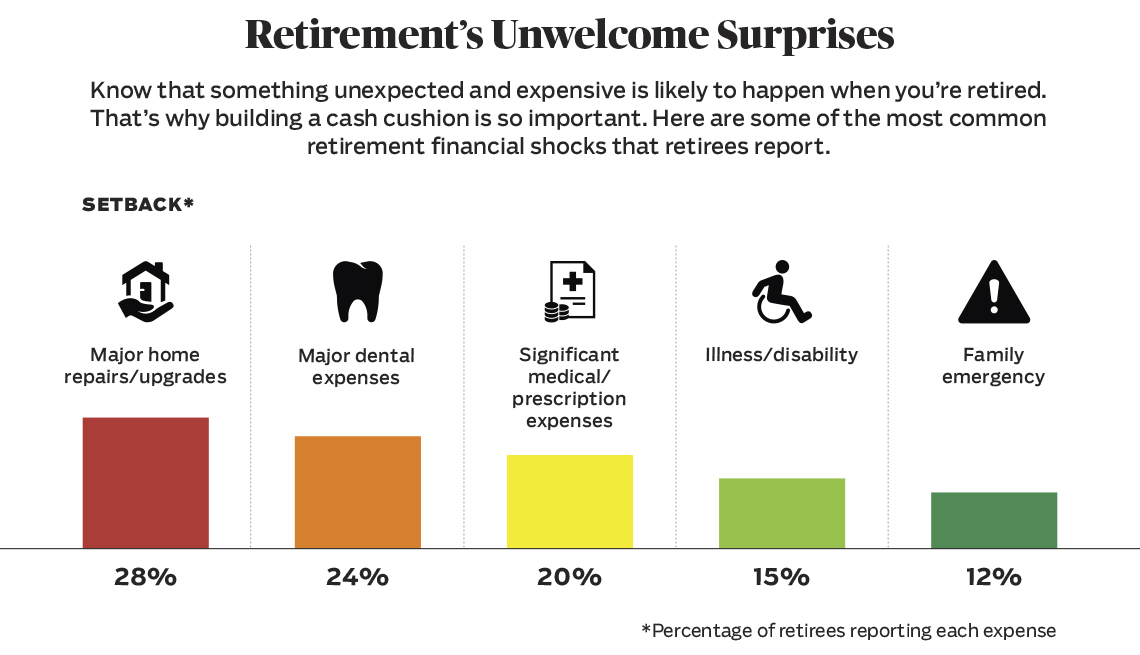Countdown to Retirement: 3 Months
Explore Social Security and price out the cost of aging in place
Money
Check in With HR
En español | What to nail down:
- Health care If you’re retiring before age 65, you have a few choices for health insurance to tide you over to Medicare: COBRA (you stay in your current plan, usually 18 months at most, paying all premiums), your spouse’s employee plan or an individual plan through the Affordable Care Act. Talk with HR about COBRA costs. Then research ACA costs at healthcare.gov. Once you turn 65, unless you’re covered under a qualifying employee plan (not COBRA), you’ll have to sign up for Medicare or face penalties.
- Pension If you are due one, decide between regular payments and a lump sum that you can move to an IRA. For many couples, a joint-and-survivor payout is preferable, since it guarantees the surviving spouse will have income for life.
- Retirement savings “Should you leave the funds at the plan or move them to an IRA?” asks Beverly DeVeny, director of retirement education at Ed Slott and Co.
- Insurance Will any insurance that is provided by your workplace continue in retirement?
Why You Should Check In With Social Security, Too
If you need your Social Security retirement benefits to start right after you stop working, make your application now. Starting early gives you time to address possible hiccups. You can apply up to four months before you want your benefits to begin, as long as you’re at least 61 years and 9 months old.
Note that you receive benefits for a particular month in the following month. So, for example, if you go on Social Security in June, you won’t receive your first check until July. You can apply online at ssa.gov or by calling Social Security’s toll-free number (800-772-1213).
Price Out Aging in Place
Want to stay in your home a long, long time? Budget for these expenses.
- Bathroom renovation (includes widening the doorway, replacing the tub with a walk-in shower, and other work): $16,000
- Door levers to replace knobs: $5 each
- No-stairs entrance to replace steps: between $300 and $2,000
- Wider doorways: about $700 each
- Chairlift (to reach the upper or lower floor): $3,000 to $10,000 or more, depending on whether the staircase is straight or curved
- Lowered kitchen cabinets and appliances: $15,000
Work
Polish Your Elevator Speech
Job hunters are often advised to develop a 30-second pitch — brief enough for an elevator ride — that describes themselves and their career goals.
You need one, too. If you hope to work part-time, your elevator speech could drum up business; if you’re quitting work cold turkey, it might inspire colleagues’ helpful ideas. So test out some pitches, says Marci Alboher, author of The Encore Career Handbook: How to Make a Living and a Difference in the Second Half of Life. You don’t need exact plans, she says, but the more details you offer, the better. “Say something specific such as, ‘I’m taking the next six months to consider ideas; here are two things I’m interested in.’ ”
Social Security Q&A Tool
Find the answers to the most common Social Security questions such as when to claim, how to maximize your retirement benefits and more.


